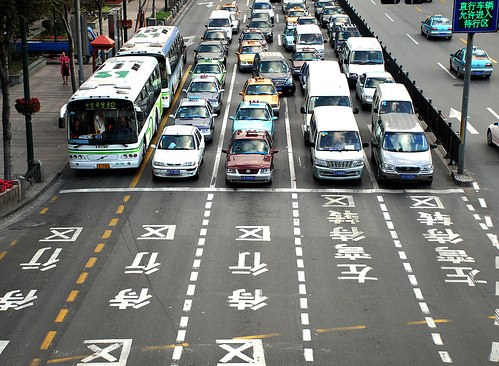To know more about the Auto Sector in China, contact us at dx@daxueconsulting.com
Auto Sector in China
According to a conservative estimate, the auto sector in China will grow tenfold between 2005 and 2030, which implies that the number of cars produced in China will amount to approximately 57 million units. Until recently, Chinese car manufacturers relied on lower prices as their source of competitive advantage. However, these manufacturers have adopted best practices and technological solutions found in the leaders in the automotive industry, indicating a shift towards producing and offering higher quality cars at a premium price. This is likely to intensify the competition in the premium car section of the automotive market, which was previously dominated by Western and Japanese brand names. However, this shift may also create opportunities for car manufacturers wishing to capture market shares in the low-cost market.
Car Imports and Exports in China
 The Chinese automotive import and export industry accounted for one-quarter of global car production. China exported 530 000 cars in 2014, whereas it imported approximately 1 400 000 cars in 2014, but imports fell to approximately 1 100 000 cars in 2015. Hence China’s net imports are larger than zero. China exports most of its cars, which is of a relatively low quality, to emerging economies in which there is a demand for cheap cars. However, as the quality of Chinese cars continues to improve, exporting to developed economies as well may be a viable option. Imported cars are usually of a higher quality than Chinese cars, and many foreign car manufacturers rely on Chinese consumers equating foreign cars with status and valuing this aspect to a significant extent. As Chinese cars increase in quality and become able to compete with foreign value offerings, imports are likely to decrease, as the demand for high-quality cars will be able to be met by domestic car manufacturers. Hence it seems that domestic car manufacturing has the brightest future in the Chinese car market, whereas the prospects for foreign car manufacturing becomes increasingly dim. This suggests that foreign car manufacturers may be well advised to open up subsidiaries and factories in China, in order to lower costs and be able to compete with the value offerings of other domestic manufacturers.
The Chinese automotive import and export industry accounted for one-quarter of global car production. China exported 530 000 cars in 2014, whereas it imported approximately 1 400 000 cars in 2014, but imports fell to approximately 1 100 000 cars in 2015. Hence China’s net imports are larger than zero. China exports most of its cars, which is of a relatively low quality, to emerging economies in which there is a demand for cheap cars. However, as the quality of Chinese cars continues to improve, exporting to developed economies as well may be a viable option. Imported cars are usually of a higher quality than Chinese cars, and many foreign car manufacturers rely on Chinese consumers equating foreign cars with status and valuing this aspect to a significant extent. As Chinese cars increase in quality and become able to compete with foreign value offerings, imports are likely to decrease, as the demand for high-quality cars will be able to be met by domestic car manufacturers. Hence it seems that domestic car manufacturing has the brightest future in the Chinese car market, whereas the prospects for foreign car manufacturing becomes increasingly dim. This suggests that foreign car manufacturers may be well advised to open up subsidiaries and factories in China, in order to lower costs and be able to compete with the value offerings of other domestic manufacturers.
Chinese Consumer Perceptions of Brands and Cars in the Automotive Industry
Amongst Chinese consumers, Western and Japanese cars are generally perceived to be of higher quality than Chinese cars, and hence Chinese consumers are willing to pay a premium for foreign cars. However, as Chinese cars increase in performance and overall quality, this perception is likely to change. Moreover, in contrast to the past, where car manufacturers could rely on Chinese consumers equating Western and Japanese cars with a high status, a survey conducted by Daxue Consulting suggests that Chinese consumers are becoming less and less status-conscious. They are becoming more practical and are pressing manufacturers for lower prices. This suggests that Chinese consumers are valuing the status aspect of car manufacturers’ value offering to a lesser and lesser extent, thereby making the car market more attractive for car manufacturers whose strength is practicality and value for money. Hence it is not only the Chinese car manufacturing industry that is experiencing a shift, but Chinese consumer perceptions are undergoing a shift as well.
As China’s middle class continues to grow and rise in affluence, the demand for cars continues to increase accordingly. However, the growth is projected to decrease. According to a recent survey, the vehicle market will grow with an average of 5% towards 2020. This stands in stark contrast to the two-digit growth over the last decades. Car manufacturing firms, either in China, or exporting cars to China, would do well to heed the change in consumer inclinations towards practicality over status. This bodes well for Chinese car manufacturers such as SGMW (In Chinese: 上汽通用五菱汽车股份有限公司), a joint venture between SAIC Motor, General Motors and Wuling Motors whose Wuling Hongguang was the most sold car in China in 2015 and thus far in 2016. Hence both new entrants and existing car manufacturers would do well to emphasize low-cost rather than quality and differentiation, in order to create a value offering that resonates with the taste of most modern Chinese consumers.
Daxue Consulting’s Expertise in the Automotive Industry in China
Daxue Consulting offers expert interviews with businesses in the automotive industry. Daxue can help its clients to get a deeper understanding of the automotive industry in China, and help them to locate opportunities in the market. A thorough understanding of the market clients wish to penetrate is both crucial and necessary in order to capture market shares. Daxue Consulting can help you gain this understanding.
See also:
- Market Survey in China
- China Market Entry
- Our latest post on Facebook about the Car-Hailing industry in China:





